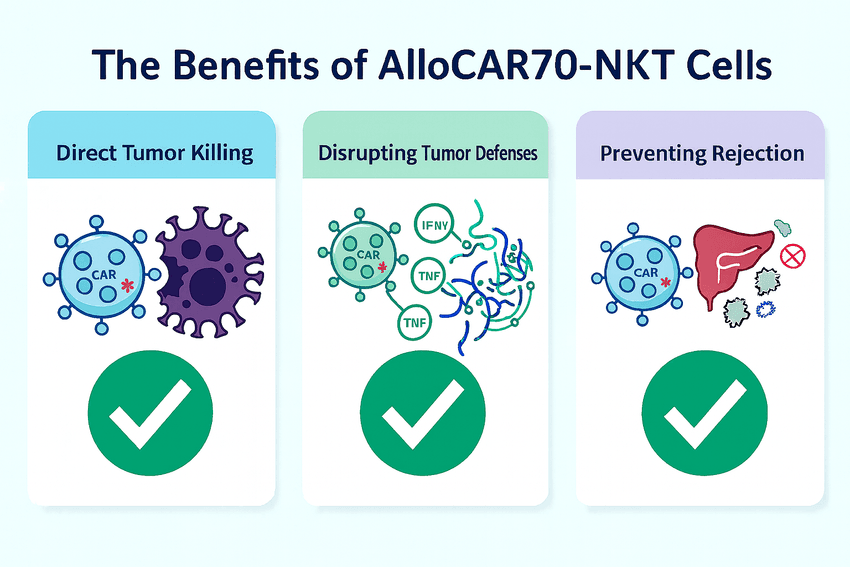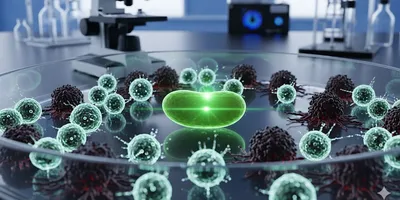Researchers at UCLA have developed a new type of immunotherapy that could transform treatment for patients with kidney cancer. Unlike traditional approaches that require engineering each patient’s own immune cells, this innovative therapy—called AlloCAR70-NKT—uses engineered immune cells derived from stem cells. This “off-the-shelf” design allows the therapy to be ready for any patient, potentially making treatment faster, safer, and more widely accessible.
“By turning stem cells into powerful cancer-fighting immune cells, we’ve eliminated the need for personalized engineering, which often delays treatment and adds risk for patients with late-stage disease,” said Dr. Lily Wu, professor at the David Geffen School of Medicine at UCLA and co-senior author of the study.
Metastatic Renal Cell Carcinoma: Why New Therapies Are Needed
Kidney cancer, particularly metastatic renal cell carcinoma, remains one of the most difficult cancers to treat. Despite advances in immunotherapy and targeted drugs, many patients either fail to respond or relapse after treatment. The five-year survival rate for advanced kidney cancer is only 12%, underscoring the urgent need for new strategies.
Traditional CAR-T therapies have had limited success in solid tumors like kidney cancer. Barriers include poor tumor penetration, immune suppression within the tumor microenvironment, and lack of long-term durability. UCLA researchers set out to overcome these challenges with AlloCAR70-NKT.
How AlloCAR70-NKT Targets Kidney Cancer Cells
The UCLA team genetically engineered natural killer T (NKT) cells from stem cells, equipping them with a chimeric antigen receptor (CAR) that targets CD70, a protein found on many kidney cancer cells. These engineered cells were further designed to resist immune rejection and remain active in the hostile tumor environment.
According to Dr. Lili Yang, professor of microbiology, immunology, and molecular genetics at UCLA, “Our goal was to create an off-the-shelf therapy that not only persists but also avoids the serious immune complications often seen with traditional CAR-T approaches.”
In preclinical studies, AlloCAR70-NKT cells mounted a multi-pronged attack:

AlloCAR70-NKT Cells engage in a multi-pronged attack.
GEMINI (2025)
Direct tumor killing: The cells destroyed kidney cancer cells through both the CAR and their natural NKT receptors, even when CD70 expression was low.
Disrupting tumor defenses: They dismantled the tumor’s protective microenvironment, which typically shields cancer from immune attack.
Preventing rejection: By eliminating CD70-positive host immune cells, the therapy persisted longer in the body while reducing the risk of long-term immune problems such as graft-versus-host disease.
Benefits of AlloCAR70-NKT: Safer and More Accessible Immunotherapy
Dr. Arnold Chin, professor of urology at UCLA and co-senior author of the study, emphasized that AlloCAR70-NKT’s multi-functional design makes it both potent and safer than many current immunotherapies. “This approach attacks not only the tumor itself but also its support system. If clinical results mirror preclinical findings, it could become a lifeline for patients who have few treatment options left,” he said.
Because the cells do not remain in the body indefinitely, the therapy also avoids the risk of chronic immune suppression. This balance of effectiveness and safety makes AlloCAR70-NKT a strong candidate for future clinical trials.
Future of Stem Cell-Based Cancer Immunotherapies
The findings, published in Cell Reports Medicine, mark an important milestone in the development of stem-cell-based immunotherapies. While additional studies and human trials are necessary, the early results suggest AlloCAR70-NKT could open the door to a new generation of universal, ready-to-use cancer therapies.
Conclusion: A New Era for Kidney Cancer Treatment
The development of AlloCAR70-NKT represents a bold leap forward in kidney cancer treatment. By combining stem cell technology with advanced genetic engineering, UCLA researchers have created an off-the-shelf immunotherapy that directly targets tumors, dismantles their defenses, and persists without causing long-term immune damage. If its promise holds true in clinical trials, this therapy could redefine how we fight not just kidney cancer but potentially other solid tumors as well.
FAQs
What makes AlloCAR70-NKT different from traditional CAR-T therapies?
Unlike CAR-T therapies that require customizing each patient’s own cells, AlloCAR70-NKT is an off-the-shelf therapy ready for any patient.
Why is kidney cancer so difficult to treat?
Metastatic renal cell carcinoma is highly resistant to existing immunotherapies and targeted drugs, with only a 12% five-year survival rate.
When will AlloCAR70-NKT be available to patients?
The therapy has shown strong results in preclinical studies, but further testing and clinical trials are required before it becomes widely available.













